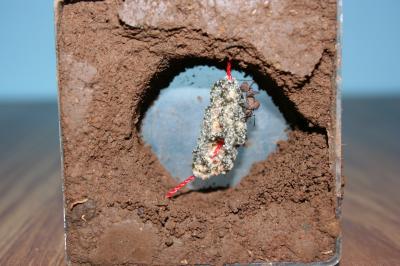Fungus-farming ants have cultivated the same fungal crops for 50 million years, they say. Each young ant queen carries a bit of fungus garden with her when she flies away to mate and establish a new nest. Short breaks in the ants' relationship with the fungus during nest establishment may contribute to the stability of this long-term mutualism.
Ants in the genus Acromyrmex cultivate a single fungal species in their nests: Leucoagaricus gonglyophorus. Mature ant colonies contain one fungal clone--a single genotype, which uses several strategies to make sure that other fungi do not invade.

Acromyrmex ant queens usually start a new fungal garden with a bit of fungus from their natal nest, but sometimes the end up cultivating another fungal clone. Credit: Sophie A.O. Armitage
"We were struck by the paradox that even though the ants transfer a single fungal strain from generation to generation, nests of different ant species, and even genera, throughout Central America share genetically very similar fungi, indicating that there are exchanges going on between fungi from different nests," said Michael Poulsen, who held a Smithsonian short term fellowship while a doctoral student at the University of Copenhagen. "In these experiments, we found that there is a very short window of time - as the young queen establishes a new nest - when partner switching can occur."
Researchers noticed that several queens from different colonies sometimes start nests very close together and wondered if young queens were given fungi from a nest other than their natal nest—would they treat it as their own fungal crop?
"That's exactly what happens," said Poulsen, now research associate at the University of Wisconsin. "Young queens adopt a fungus from another nest and cultivate it in their new nest. This sort of temporary partner switching probably acts as an evolutionary safety net in the ant-fungus mutualism by preventing the accumulation of deleterious mutations."
The study, published in the journal Evolution, was supported by The Smithsonian Tropical Research Institute, the Lundbeck Foundation, the U.S. National Science Foundation and the Danish National Research Foundation. Panama's National Environmental Authority (ANAM) issued permits.






Comments